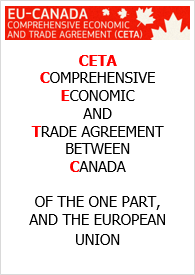CETA: COMPREHENSIVE ECONOMIC AND TRADE AGREEMENT
Accordo economico e commerciale globale tra Canada ed UE (CETA)
Maggio 2016: è in prossimità della ratifica l'accordo commerciale CETA tra Canada e l'UE che dovrebbe entrare in vigore nel 2017.
Proposta di regolamento di applicazione dell'accordo economico e commerciale UE-Canada globale (CETA) che accompagna le decisioni che autorizzano la firma e la conclusione del CETA.
L’accordo economico e commerciale globale (CETA) è un trattato tra l’UE e il Canada negoziato di recente. Una volta applicato, offrirà alle imprese europee nuove e migliori opportunità commerciali in Canada e sosterrà la creazione di posti di lavoro in Europa.
L’accordo affronterà una serie di questioni per agevolare gli scambi commerciali con il Canada. Eliminerà i dazi doganali, porrà fine alle limitazioni nell’accesso agli appalti pubblici, aprirà il mercato dei servizi, offrirà condizioni prevedibili agli investitori e, cosa non meno importante, contribuirà a prevenire le copie illecite di innovazioni e prodotti tradizionali dell'UE.
Il CETA contiene anche tutte le garanzie necessarie per far sì che i vantaggi economici ottenuti non vadano a scapito della democrazia, dell’ambiente o della salute e della sicurezza dei consumatori.
L'accordo CETA in sintesi
- è un accordo economico globale tra l’UE e il Canada
- abolirà il 99% dei dazi doganali e molti altri ostacoli per le imprese
- l'obiettivo è rilanciare il commercio, rafforzare le relazioni economiche e creare nuovi posti di lavoro
- farà crescere il PIL dell'UE di 12 miliardi di euro
- il testo concordato dell'accordo è pubblicamente accessibile
- l'accordo è stato presentato per approvazione democratica da parte dell’UE
Comunicato
Monday, 29 February 2016
EU Commissioner for Trade Cecilia Malmström and the Honourable Chrystia Freeland, Minister of International Trade of Canada, today released the following statement:
“Canada and the European Commission are very pleased to announce that the legal review of the Canada-European Union Comprehensive Economic and Trade Agreement (CETA) English text has been completed.
As part of the legal review, modifications were made to the Investment Chapter, further to discussions between EU and Canadian officials. With these modifications, Canada and the EU will strengthen the provisions on governments’ right to regulate; move to a permanent, transparent, and institutionalised dispute settlement tribunal; revise the process for the selection of tribunal members, who will adjudicate investor claims; set out more detailed commitments on ethics for all tribunal members; and agree to an appeal system.
We have responded to Canadians, EU citizens, and businesses with a fairer, more transparent, system.
These modifications reflect our desire to reform investment protection and dispute resolution provisions and to continue working together to improve the process, including working with other trading partners to pursue the establishment of a multilateral investment tribunal, a project to which the EU and Canada are firmly committed.
Canada and the European Commission will now complete the translation and review of the text in French and the 21 other EU treaty languages.
Once finalised, we will focus on the swift ratification of CETA so that individuals and businesses, both large and small, are able to benefit from the opportunities offered by this gold standard agreement. We are confident that CETA will be signed in 2016 and enter into force in 2017.”
http://ec.europa.eu/trade/policy/in-focus/ceta/index_it.htm
http://www.consilium.europa.eu/en/press/press-releases/2015/12/15-eu-canada-trade-negotiating-mandate-made-public/




















